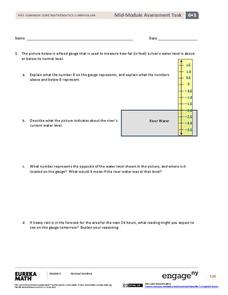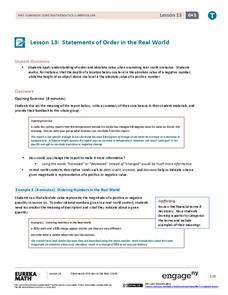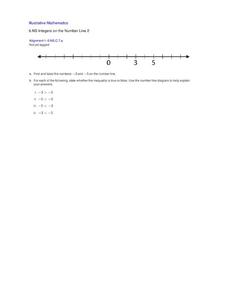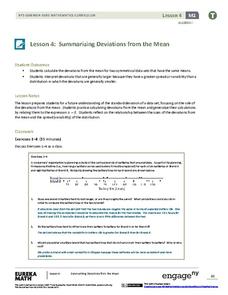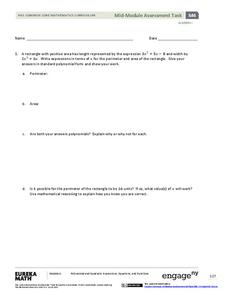EngageNY
Real-World Positive and Negative Numbers and Zero II
Continuing from the previous lesson plan in the series, scholars learn to use positive and negative integers to describe real-world situations. In groups, they come up with their own situations for given positive and negative...
EngageNY
Real-World Positive and Negative Numbers and Zero
Class members investigate how positive and negative numbers are useful in the real world. Individuals first read a short passage and identify terms indicating positive and negative numbers. They consider situations involving positive...
EngageNY
Positive and Negative Numbers on the Number Line—Opposite Direction and Value
Make your own number line ... using a compass. The first installment of a 21-part series has scholars investigate positive and negative integers on a number line by using a compass to construct points that are the same distance from zero...
EngageNY
Mid-Module Assessment Task: Grade 6 Math Module 3
Ensure your class has a solid understanding of positive and negative integers before moving on. The 14th installment of a 21-part series is a mid-module assessment. Scholars solve problems on positive and negative integers, on...
EngageNY
End-of-Module Assessment Task: Grade 6 Math Module 3
The last installment of a 21-part module is an end-of-module assessment. Individuals show their understanding of positive and negative numbers on the number line, absolute value, and the coordinate plane in a variety of contexts.
EngageNY
Statements of Order in the Real World
Positive and negative numbers are all around us. Groups read short story contexts and identify a rational number that represents the values in the context. They order the rational numbers and interpret statements of inequality.
Illustrative Mathematics
It's Warmer in Miami
Brrrr it's cold in Alaska! When given the temperatures of Anchorage and Miami in the winter, your mathematicians will calculate how much warmer it is in Miami. Answer key provides two different solution choices. Great as a warm-up for...
EngageNY
Exponents
Powered up! Here's a great resource on exponents. Scholars build on their previous understanding of exponents to include all positive real number bases. Distinguishing between an and a^n is a major goal in the fifth lesson of a 36-part...
Illustrative Mathematics
Integers on the Number Line 2
Four inequality statements are given for the same two negative numbers. The resource is a good practice for pupils to interpret statements of inequalities relative to the position on the number line. The objective is for pupils to...
EngageNY
Describing the Center of a Distribution
So the mean is not always the best center? By working through this exploratory activity, the class comes to realize that depending upon the shape of a distribution, different centers should be chosen. Learners continue to explore...
EngageNY
The Slope of a Non-Vertical Line
This lesson introduces the idea of slope and defines it as a numerical measurement of the steepness of a line. Pupils then use the definition to compare lines, find positive and negative slopes, and notice their definition holds for...
Mt. San Antonio Collage
Quiz 2: Polynomials
Four questions that get right to the polynomial point. High schoolers list all the attributes of a polynomial function, including finding all complex zeros. The last two questions prompt them to write a function based on the given...
EngageNY
The Relationship Between Absolute Value and Order
Order up a resource on absolute value and order. The 12th installment of a 21-part module investigates the relationship between absolute value and the order of numbers on a number line. Scholars determine how the actual values and the...
EngageNY
Mid-Module Assessment Task: Grade 7 Module 2
A seven-question assessment determines how well your learners understand the procedures to add, subtract, multiply, and divide signed rational numbers. Pupils show their understanding through problem-solving situations.
EngageNY
Summarizing Deviations from the Mean
Through a series of problems, learners determine the variability of a data set by looking at the deviations from the mean. Estimating means of larger data sets presented in histograms and providing a way to calculate an...
EngageNY
Interpreting Correlation
Is 0.56 stronger than -0.78? Interpret the correlation coefficient as the strength and direction of a linear relationship between two variables. An algebra lesson introduces the correlation coefficient by estimating and then...
Illustrative Mathematics
How Many Tenths and Hundredths?
Four hundredths + one tenth = 14 hundredths. Learners complete place order equations in order to make each equation true. Hundredth and tenths are the focus of the worksheet.
Discovering Gifts In Middle School
Multiple Intelligences Checklist
Invite your pupils to discover their strengths with a multiple intelligences assessment. They read through several pages of activities and check off the items that apply. Learners then tally up their scores to determine which of the...
Curated OER
8.SP.1Texting and Grades I
Here is a fitting question for middle schoolers to consider: Is there a relationship between grade point average and frequency of sending texts? Starting statisticians examine a scatter plot and discuss any patterns seen.
EngageNY
Mid-Module Assessment Task - Algebra 1 (module 4)
Performance task questions are the most difficult to write. Use this assessment so you don't have to! These questions assess factoring quadratics, modeling with quadratics, and key features of quadratic graphs. All questions require...
EngageNY
Mid-Module Assessment Task: Grade 8 Module 7
Assess pupil understanding of rational and irrational numbers with a mid-module assessment that is the 15th lesson in the 25-part series. The questions represent the objectives in the first half of the series. Topics include decimal...
EngageNY
Mid-Module Assessment Task - Algebra 2 (Module 3)
The 15th installment of a 35-part module is a mid-module assessment task. Covering concepts in the first half of the module, the task acts as a formative assessment, providing you with valuable information on how learners are doing.
EngageNY
End-of-Module Assessment Task — Precalculus (Module 1)
A transformational assessment determines how far pupils are advancing toward mastering complex and matrix standards. The assessment checks the learners' understanding of linear transformations, complex numbers and the complex plane,...
EngageNY
End-of-Module Assessment Task: Pre-Calculus Module 2
Assess pupil understanding of the relationship between matrices, vectors, linear transformations, and parametric equations. Questions range from recall to more complex levels of thinking. Problems represent topics learned throughout the...
Other popular searches
- List of Positive Attributes
- Positive Attributes Friend
- Free Positive Attributes
- Show Positive Attributes



